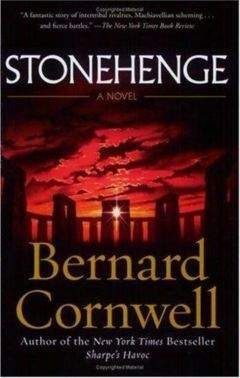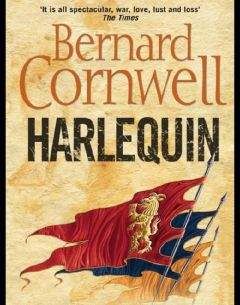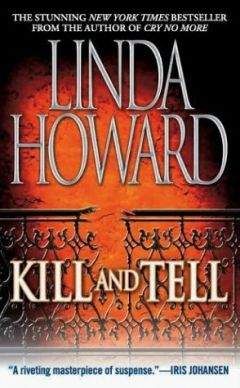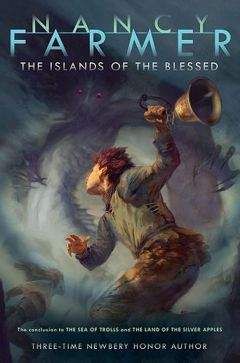Ознакомительная версия.
'I'm a bloody English archer.'
'You're different,' Robbie said, and he meant it for he was puzzled by Thomas. Most archers were country born, the sons of yeomen or smiths or bailiffs, while a few were the sons of labourers, but none in Robbie's experience was well born, which Thomas plainly was for he spoke French and Latin, he was confident in the company of lords and other archers deferred to him. Robbie might look like a wild Scottish fighter, but he was the son of a gentleman and nephew to the Knight of Liddesdale, and thus he regarded archers as inferior beings who, in a properly arranged universe, could be ridden down and slaughtered like game, but he liked Thomas. 'You're just bloody different,' he said. 'Mind you, when my ransom's paid and I'm safe home, I'll come back and kill you.'
Thomas laughed, but it was forced laughter. He was nervous. He put the nervousness down to being in the unfamiliar position of leading a raid. This was his idea, and it had been his promises that brought most of these men on the long ride. He had claimed that Roncelets, being so far from any English stronghold, lay in unplundered country. Snatch the child, he had promised them, and they could then pillage as much as they wished or at least until the enemy woke up and organized a pur-suit, and that promise had persuaded men to follow him and the responsibility of it weighed on Thomas. He also resented worrying. His ambition, after all, was to be the leader of a war band like Will Skeat had been before his injury, and what hope did he have of being a good leader if he fretted over a little raid like this? Yet fret he did, and he worried most of all that he might not have anticipated everything that could go wrong; and the men who had joined him gave him small consolation for, except for his friends and the newly arrived Flemings, they were the poorest and least well equipped of all the adventurers who had come to La Roche-Derrien in search of wealth. One of them, a quarrelsome man-at-arms from western Brittany, became drunk on the first day and Thomas discovered he had two water skins filled with a fierce apple spirit. He broke both skins, whereupon the enraged Breton drew his sword and attacked Thomas, but he was too drunk to see properly and a knee to his groin and a thump over the head put him down hard. Thomas took the man's horse and left him groaning in the mud, which meant he was down to fourteen men. 'That will have helped,' Sir Guillaume said cheerfully.
Thomas said nothing. He deserved to be mocked, he thought.
'No, I mean it! You knock a man down one day and you might do it again. You know why some men are bad leaders?'
'Why?'
'They want to be liked.'
'That's bad?' Thomas asked.
'Men want to admire their leaders, they want to fear them, and above all they want them to be successful. What does being liked have to do with any of that? If the leader is a good man he will be liked and if he's not, he won't, and if he is a good man and a bad leader then he is better off dead. You see? I am full of wisdom.' Sir Guillaume laughed. He might be down on his luck, his manor lost and fortune gone, but he was riding to a fight and that cheered him. 'The good thing about this rain,' he said, 'is that the enemy won't expect you to be riding in it. It's stay-at-home weather.'
'They'll know we've left La Roche-Derrien,' Thomas said. He was certain that Charles of Blois had as many spies in the town as the English had in Rennes.
'He won't know yet,' Sir Guillaume said. 'We're travelling faster than any message can go. Anyway, while they know we've left La Roche-Derrien, they don't know where we're going.'
They rode south in hope that the enemy would think they were planning to scavenge the farms near Guingamp, then late in the first day they turned eastwards and climbed into a high, empty country. The hazels were in blossom and rooks were calling from the bare elm tops, signs that the year was turning away from winter. They camped in a deserted farm, sheltered by low scorched stone walls, and before the last glimmer of dusk faded they had a good augury when Robbie, rooting about in the ruins of the barn, discovered a leather bag half buried beside the broken wall. The exorbitant rain had washed the earth away above the bag which held a small silver plate and three handfuls of coins. Whoever had buried the money must have thought the coins too heavy to carry or else had feared being robbed during their exile from the house.
'We, how do you say?' Sir Lodewijk made a chopping motion with his hand as if he cut up a pie.
'Share?'
'Ja! We share?'
'No,' Thomas said. That had not been the agreement. He would have preferred to have shared, for that was how Will Skeat had treated spoils, but the men who rode with him wanted to keep whatever they found.
Sir Lodewijk bridled. 'It is how we do it, ja? We share.'
'We don't share,' Sir Guillaume said harshly, 'it's been agreed.' He spoke in French and Sir Lodewijk reacted as though he had been struck, but he understood well enough and just turned and walked away.
'Tell your Scottish friend to watch his back,' Sir Guillaume said to Thomas.
'Lodewijk's not so bad,' Thomas said, 'you just don't like him because he's Flemish.'
'I hate the Flemish,' Sir Guillaume agreed, 'they're dull, stupid porkwits. Like the English.'
The small argument with the Flemings did not fester. Next morning Sir Lodewijk and his companions were cheerful and, because their horses were much fresher and fitter than any others, they volunteered, with much broken English and elaborate hand signals, to ride ahead as scouts and all day their black and white surcoats appeared and reappeared far ahead and each time they waved the main party on, signalling that there was no danger. The deeper they went into enemy territory the greater the risk, but the Flemings'
watchfulness meant that they made good progress. They were weaving a path either side of the main highway that ran east and west along Brittany's spine, a road flanked by deep woods, which hid the raiders from the few people who travelled on the road. They saw only two drovers with their skinny cattle and a priest leading a band of pilgrims who walked barefoot, waved tattered branches and sang a dirge. No pickings there. Next day they went south again. They were now entering a country where the farms had escaped English raiders and so the people were unafraid of horsemen and the pastures were filled with ewes and their new-born lambs, many of which had been torn to bloody scraps because the men of Brittany were too busy hunt-ing each other and so the foxes thrived and the lambs died. Shepherds' dogs barked at the grey-mailed men, and now Thomas no longer had the Flemings ride ahead, but instead he and Sir Guillaume led the horse-men and, if challenged, they answered in French, claiming to be supporters of Charles of Blois. 'Where's Roncelets?' they constantly asked and at first found no one who knew, but as the morning wore on they dis-covered a man who had at least heard of the place, then another who said his father had once been there and he thought it was beyond the ridge, the forest and the river, and then a third who gave them precise directions. The tower, he said, was no more than a half-day's journey away at the far end of a long wooded ridge that ran between two rivers. He showed them where to ford the nearer river, told them to follow the ridge crest southwards and then bowed his head in thanks for the coin Thomas gave him.
They crossed the river, climbed the ridge and rode south. Thomas knew they must be close to Roncelets when they stopped for the third night, but he did not press on for he reckoned it would be better to come to the tower in the dawn and so they camped under beech trees, shivering because they dared not light a fire, and Thomas slept badly because he was listening to the strange things crackle and rustle deep in the woods and he feared those noises might be made by patrols sent out by the Lord of Roncelets. Yet no patrols found them. Thomas doubted there were any patrols except in his imagination, yet still he could not sleep and so, very early, while the others snored, he blundered through the trees to where the ridge's flank fell steeply away and he stared into the night in hope of seeing a glimmer of light cast from the battlements of the Tower of Roncelets. He saw nothing, but he heard sheep bleating piteously further down the slope and he guessed that a fox had got among the lambs and was slaughtering them.
'The shepherd's not doing his job.' Someone spoke
in French and Thomas turned, thinking it was one of Sir Guillaume's men-at-arms, but saw, in the small moonlight, that it was Sir Lodewijk.
'I thought you wouldn't use French?' Thomas said.
'There are times when I do,' Sir Lodewijk said and he strolled to stand beside Thomas and then, smiling, he rammed a makeshift club into Thomas's belly and when Thomas gasped and bent over the Fleming slammed the broken branch over his head and then kicked him in the chest. The attack was sudden, unexpected and overwhelming. Thomas was fighting for breath, half doubled over, staggering, and he tried to straighten and claw at Sir Lodewijk's eyes, but the club hit him a re-sounding blow on the side of the head and Thomas was down.
The Flemings' three horses had been tied to trees a small way from the others. No one had thought that strange and no one had remarked that the beasts had been left saddled and no one woke as the horses were untethered and led away. Sir Guillaume alone stirred when Sir Lodewijk collected his pieces of plate armour. 'Is it dawn?' he asked.
'Not yet,' Sir Lodewijk answered in soft French, then carried his armour and weapons out to the wood's edge where Jan and Pieter were lashing Thomas's wrists and ankles. They slung him belly down on a horse's back, tied him to the beast's girth strap and then took him eastwards.
Sir Guillaume woke properly twenty minutes later. The birds were filling the trees with song and the sun was a hint of light in the misted east. Thomas had vanished. His mail coat, his arrow bag, his sword, his helmet, his cloak, his saddle and his big black bow were all still there, but Thomas and the three Flemings were gone.
Thomas was taken to the Tower of Roncelets, a four-square, unadorned fortress that reared from an outcrop of rock high above a river bend. A bridge, made of the same grey stone as the tower, carried the high road to Nantes across the river and no merchant could move his goods across the bridge without paying dues to the Lord of Roncelets whose banner of two black chevrons on a yellow field flew from the tower's high ramparts. His men wore the black and yellow stripes as a livery and were inevitably called guepes, wasps. This far east in Brittany the folk spoke French rather than Breton and their tower was nicknamed the Guepier, the wasp's nest, though on this late winter's morning most of the soldiers in the village wore plain black liveries rather than the waspish stripes of the Lord of Roncelets. The newcomers were quartered in the little cottages that lay between the Guepier and the bridge and it was in one of those cottages that Sir Lodewijk and his two companions rejoined their comrades. 'He's up in the castle' – Sir Lodewijk jerked his head towards the tower – 'and God help him.'
'No trouble?' a man asked.
'No trouble at all,' Sir Lodewijk said. He had drawn a knife and was cutting off the white stripes that had been sewn onto his surcoat. 'He made it easy for us. A stupid bloody Englishman, eh?'
'So why do they want him?'
'God knows and who cares? All that matters is that they've got him and the devil will have him soon.' Sir Lodewijk yawned hugely. 'And there's a dozen more of them out in the woods so we're riding out to find them.'
Fifty horsemen rode westwards from the village. The sound of their hooves and their curb chains and creak-ing leather armour was loud, but quickly faded when they rode into the ridge's thick woods. A pair of king-fishers, startling blue, whipped up the river and vanished in shadows. Long weeds waved in the current where a flash of silver showed that the salmon were returning. A girl carried a pail of milk down the village street and wept because in the night she had been raped by one of the black-liveried soldiers and she knew it was futile to complain for no one would protect her or even make a protest on her behalf. The village priest saw her, understood why she was weeping, and reversed his course so he would not have to face her. The black and yellow flag on the Guepier's ramparts flapped in a small gust of wind, then hung limp. Two young men with hooded falcons perched on their arms rode out of the tower and turned south. The great door grated shut behind them and the sound of the heavy locking bar dropping into its brackets could be heard throughout the village.
Thomas heard it too. The sound shuddered through the rock on which the Guepier was built and reverberated up the winding stair to the long, bare room where he had been taken. Two windows lit the chamber, but the wall was so thick and the embrasures so deep that Thomas, who was chained between the windows, could not see through either of them. An empty hearth stood on the opposite wall, the stones of its chimney hood stained black. The floor's wide wooden boards were scarred and worn by too many nailstudded boots and Thomas guessed this had been a barrack room. It probably still was, but now it was needed as his prison and so the men-at-arms had been ordered out and Thomas carried in and manacled to the iron ring set into the wall between the two windows. The manacles encircled his wrists and held them behind his back and were connected to the iron ring in the wall by three feet of chain. He had tested the ring, seeing if he could shift it or perhaps snap a link of the chain, but all he did was hurt his wrists. A woman laughed somewhere in the tower. Feet sounded on the circular stairs beyond the door, but no one came into the room and the footsteps faded. Thomas wondered why the iron ring should have been cemented into the wall. It seemed an odd thing to have so high up the tower where no horse would ever need to be tied. Maybe it had been placed there when the castle had been built. He had watched once as men hauled stones to the top of a church tower and they had used a pulley attached to a ring like this one. It was better to think of the ring and of stones and of masons making the tower than to reflect on his idiocy in being so easily captured, or to wonder what was about to happen to him, though of course he did wonder about that and nowhere in his imagination was the answer comforting. He tugged on the ring again, hoping that it had been there a long time and that the mortar that bedded it would have been weakened, but all he did was break the skin of his wrists on the manacles' sharp edges. The woman laughed again and a child's voice sounded.
A bird flew in one of the windows, fluttered for a few heartbeats and then vanished again, evidently rejecting the room as a nesting site. Thomas closed his eyes and softly recited the prayer of the Grail, the same prayer that Christ had uttered in Gethsemane:
'Pater, si vis, transfer calicem isturn a me.' Father, if you're willing, take this cup from me. Thomas repeated the prayer over and over, suspecting it was a waste of breath. God had not spared his own son the agony of Golgotha so why would He spare Thomas? Yet what hope did he have without prayer? He wanted to weep for his own naivete in thinking he could ride here and somehow snatch the child from this stronghold that stank of woodsmoke, horse dung and rancid fat. It had all been so stupid and he knew he had not done it for the Grail, but to impress Jeanette. He was a fool, such a damned fool, and like a fool he had walked into his enemy's trap and he knew he would not be ransomed. What value did he have? So why was he even alive? Because they wanted something from him and just then the door to the room opened and Thomas opened his eyes. A man in a monk's black robe carried two trestles into the room. He had untonsured hair, suggesting he was a lay servant to a monastery. 'Who are you?' Thomas asked. The man, who was short and had a slight limp, gave no answer, but just placed the two trestles in the centre of the floor and, a moment later, brought in five planks that he laid across the trestles to make a table. A second untonsured man, similarly robed in black, entered the room and stared at Thomas. 'Who are you?' Thomas asked again, but the second man was as silent as the first. He was a big man with bony ridges over his eyes and sunken cheeks and he inspected Thomas as if he were appraising a bullock at slaughter time.
Ознакомительная версия.





